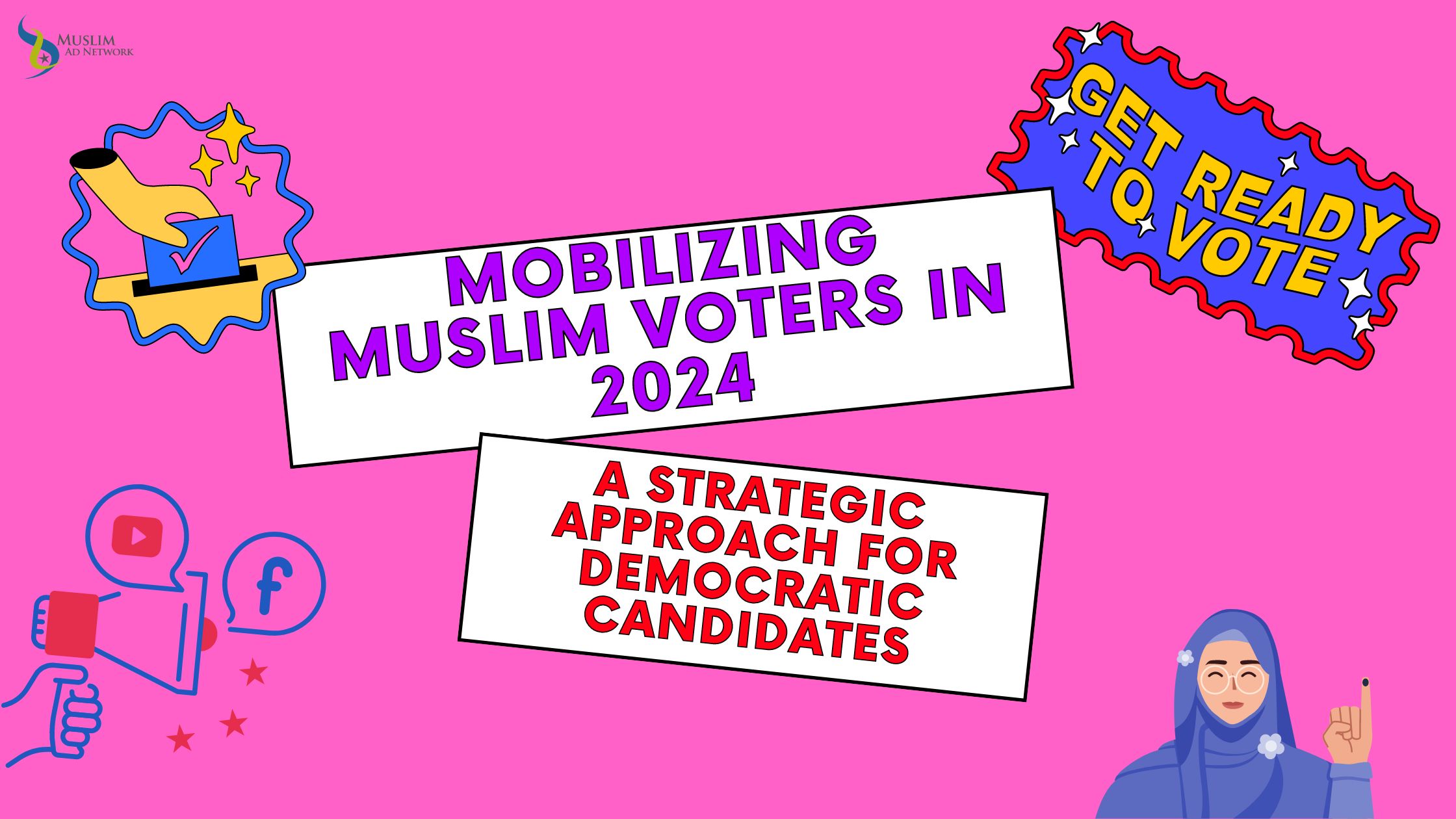
As the 2024 presidential election approaches, the Democratic field is wide open following President Biden’s decision not to seek re-election. With the race heating up, it’s crucial for Democratic candidates to build relationships with key voting blocs, including Muslim Americans. A growing and diverse population, Muslim voters can be decisive, particularly in battleground states like Michigan and Pennsylvania. But to secure their votes, candidates must do more than simply address their policy concerns—they need to overcome barriers to participation and cut through the noise of political messaging.
Get as Many Muslims as Possible to Accept Voting as Permissible
One critical element of engaging Muslim voters is addressing the misconception that voting might be impermissible (haram) under Islamic law. Many Muslims follow the principles of Islamic jurisprudence (Fiqh), which governs their daily decisions, including political participation.
According to Dr. Wael Hamza, Fiqh is “our understanding and knowledge of Allah’s law.” Within this framework, a growing consensus among Islamic scholars asserts that voting can be Halal (permissible) because it serves a greater good: helping to avert hardship and prevent tyranny. This is particularly true in a political landscape where Muslim Americans may face targeted policies if they do not participate in elections.
Campaigns must recognize this dynamic and work with organizations like Emgage and CAIR (Council on American-Islamic Relations), which are already addressing these concerns. By framing voting as a way to protect civil rights and counteract Islamophobia, Democratic candidates can encourage more Muslim Americans to participate in the 2024 election. Emgage, for example, has been actively working to educate and mobilize Muslim voters, providing religious and legal arguments that voting is both a civic duty and a religiously permissible act in the context of American democracy.
Cutting Through the Noise to Reach Muslim Voters
The challenge in engaging Muslim voters is not just about addressing Fiqh concerns but also breaking through the overwhelming volume of political messaging. Like many other demographics, Muslim voters are inundated with political ads and information, making it difficult for campaigns to stand out.
To cut through the noise, candidates need to adopt tailored, culturally-sensitive marketing strategies. In our previous article, we discussed how effective outreach to Muslim consumers requires a clear understanding of the community’s values and priorities. This is where digital marketing strategies come into play—targeted ads, content that resonates with Muslim concerns, and authentic, values-based engagement. For instance, messaging that highlights a candidate’s stance on civil rights, healthcare access, and foreign policy in relation to Muslim-majority countries can resonate more than generic campaign promises.
Online platforms such as ours, Muslim Ad Network, are powerful tools for connecting with Muslim voters. These platforms allow campaigns to deliver specific content through trusted channels within the community, ensuring that political messaging is not only heard but trusted. Muslim Americans often prefer content that reflects their faith and values, so candidates must be thoughtful in their communication strategies.
The Role of Grassroots Organizations
Grassroots organizations like Emgage USA and MPower Change have been instrumental in mobilizing Muslim voters across the country. They offer a blueprint for how candidates can engage with this community. Emgage, for example, focuses on voter registration, education, and civic engagement, helping to increase Muslim voter turnout. In 2020, the organization helped push Muslim voter turnout to new highs in key battleground states, with a focus on electing candidates who support justice and equity for all.
These organizations can provide a bridge between political campaigns and the Muslim community, offering both trust and insight into the concerns of Muslim voters. By partnering with these grassroots movements, Democratic candidates can demonstrate their commitment to Muslim issues and provide the resources needed to mobilize voters. Whether it’s through town halls, targeted ads, or social media campaigns, collaboration with these organizations can amplify the impact of voter outreach efforts.
Why the Muslim Vote Matters in 2024
In previous elections, the Muslim vote has been underestimated or taken for granted. But with over 1 million eligible Muslim voters in the U.S., their impact cannot be ignored. Muslim voters are concentrated in critical swing states, making them key to deciding close races. In 2020, Muslim turnout in places like Michigan helped tip the scales in Joe Biden’s favor.
This election cycle, the stakes are even higher. As noted by Al Jazeera, Muslim voters are not monolithic but share common concerns about civil rights, Islamophobia, and U.S. foreign policy. For many, the re-emergence of Donald Trump as a frontrunner for the GOP nomination brings back memories of policies like the “Muslim ban” and divisive rhetoric that fueled Islamophobia. At the same time, Governor Ron DeSantis’ right-wing stance on immigration and foreign policy is likely to alienate Muslim voters even further.
In response, Democratic candidates must position themselves as defenders of civil liberties and champions of human rights, both domestically and internationally. Addressing concerns about U.S. foreign policy—particularly in Palestine, Yemen, and Syria—will be essential in maintaining the trust of Muslim voters. As seen in The Nation’s analysis of Muslim voter behavior in the U.K. and U.S., voters are increasingly demanding more from political parties, and the 2024 election will be no different.
Building a Long-Term Relationship with Muslim Voters
Securing the Muslim vote in 2024 requires more than just one-off promises during election season. Candidates must demonstrate a long-term commitment to the issues that matter most to Muslim Americans. Whether it’s combating Islamophobia, reforming immigration policies, or addressing global conflicts involving Muslim-majority nations, the Democratic field must present a clear and credible vision for the future.
The Council on American-Islamic Relations (CAIR) is urging Muslim voters to participate in campaigns like “Vote for Justice,” which emphasizes voting as a tool for achieving equity and combating injustice. Candidates who align their platforms with these values and engage authentically with Muslim communities will find themselves with a motivated, engaged electorate ready to vote in 2024.
In conclusion, the 2024 election presents a unique opportunity for Democratic candidates to secure the Muslim vote by addressing religious concerns, cutting through the noise with culturally relevant messaging, and collaborating with grassroots organizations. With the right strategy, Muslim voters could play a decisive role in the outcome of this high-stakes election.
Those who believe that voting is permissible, go out and do your duties. Those who feel differently should respect the ijtihaad (effort towards doing what one believes is right) of others. And vice versa too.
In the end, it is Allah the almighty who gives power and honor and takes it away. We just do our part.
Say: “O Allah! Lord of Power (And Rule), Thou givest power to whom Thou pleasest, and Thou strippest off power from whom Thou pleasest: Thou enduest with honour whom Thou pleasest, and Thou bringest low whom Thou pleasest: In Thy hand is all good. Verily, over all things Thou hast power. Quran 3:26
[button text=”start targeting muslim consumers” color=”success” style=”shade” size=”xxlarge” animate=”blurIn” radius=”10″ depth=”4″ depth_hover=”5″ link=”https://muslimadnetwork.com/get-started/”]